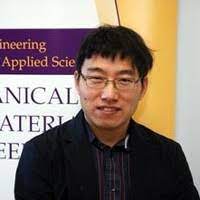
搜索网站、位置和人员

新闻与活动 活动信息
工学院专题学术讲座 | Qingguo Li 李庆国: Biomechanical Energy Harvesting: From Power Generation to Improving Walking Efficiency
时间
2023年6月13日(周二)
10:00-11:30
地点
西湖大学云谷校区E10-304
主持
西湖大学工学院 范迪夏 博士
受众
全体师生
分类
学术与研究
工学院专题学术讲座 | Qingguo Li 李庆国: Biomechanical Energy Harvesting: From Power Generation to Improving Walking Efficiency
时间:2023年6月13日(周二) 10:00-11:30
Time: 10:00-11:30, Tuesday, June 13, 2023
地点:西湖大学云谷校区E10-304
Venue: Room E10-304, Yungu Campus
主持人: 西湖大学工学院 范迪夏 博士
Host: Dr. Dixia Fan, Assistant Professor, Westlake University
语言:英文
Language: English
主讲嘉宾/Speaker:

Prof. Qingguo Li 李庆国
Department of Mechanical and Materials Engineering
Queen’s University
主讲人简介/Biography:
Qingguo Li received a bachelor’s degree in Aircraft Manufacturing Engineering and a Master’s degree in Automatic Control, both from Northwestern Polytechnical University, China. Dr. Li completed his Ph.D. degree on robotics from the School of Engineering, Simon Fraser University (SFU), Burnaby, BC, Canada, in 2006. He held a post-doctoral position with the School of Kinesiology, SFU, from 2005 to 2008. He joined Queen’s University, Kinston, ON, Canada, in 2009, where he is currently an Associate Professor with the Department of Mechanical and Materials Engineering (MME). He serves as the Associate Head and the Chair for the Master of Engineering Program. Dr. Li’s research activities focus on wearable robotics and sensors for human movement monitoring, rehabilitation, human augmentation, and injury prevention applications. Dr. Li’s work has been published in high impact journals including two publications on Journal of Science. Dr. Li has experience in the commercialization of new technologies and innovations through start-up companies. He holds several US and Canadian Patents, and has co-founded an energy harvesting and exoskeleton company, Bionic Power Inc. Dr. Li was a recipient of the Governor General’s Gold Medal of Canada in 2006.
讲座摘要/Abstract:
Biomechanical energy harvesters and exoskeletons are devices that interact with the user, either extract energy from or input energy to the user. While the goal of energy harvesting is to generate electricity with minimal user effort, the exoskeleton aims at improving walking efficiency. With these two competing objectives, understanding the user-device interaction becomes more important. In this talk, I will discuss our work on energy harvesting and walking assistance exoskeletons. Design principles, and human experimentation will be presented to demonstrate the importance of user-device interaction in exoskeleton system design.

















